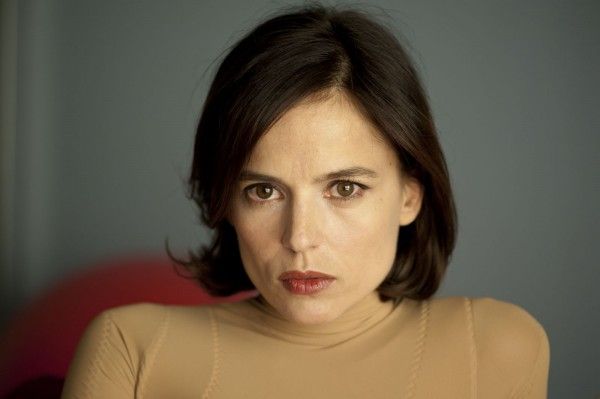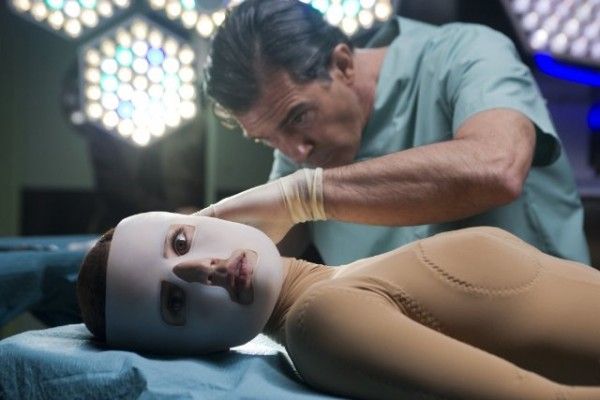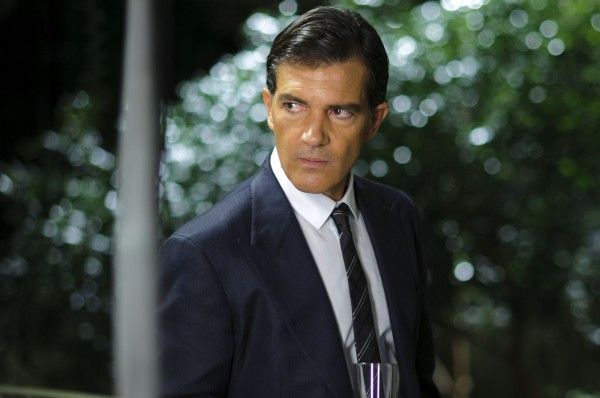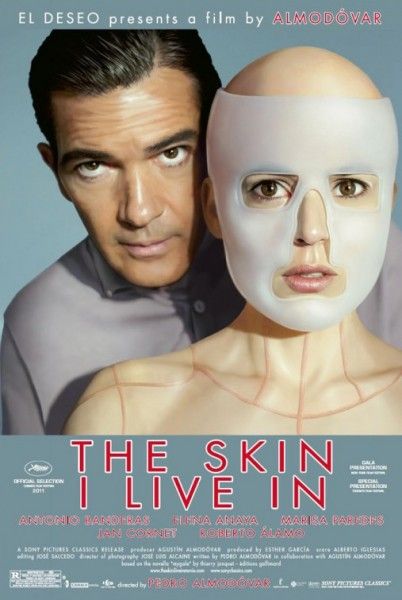[This is a re-print of my review that ran during the Toronto International Film Festival. The film opens today in limited release.]
Never doubt Pedro Almodóvar. He may not deliver a movie you like, but it will probably be a movie unlike any you've seen that year. With his latest film, The Skin I Live In, he slow plays the audience. He introduces a slightly off-kilter world, but you can wrap your mind around it. When the film gets melodramatic, you're slightly amused but you know that Almodóvar is no stranger to that tone. Then the movie gets a little slow, a little redundant, and dare I say a little pedestrian. And then The Skin I Live In starts building to something. You tell yourself…"No…that's not going to happen. That's too fucking crazy. He wouldn't—" and then the film hits you with a twist that's narratively sound, thematically fitting, and will leave you picking your exploded brain off the floor.
"Our face identifies us," plastic surgeon Robert Ledgard (Antonio Banderas) tells an audience of medical professionals. Robert had invented a "second skin" in his own private medical lab and he's done it with the help of Vera (Elena Anaya), a young woman in a bodysuit that's imprisoned in his home. It's clear that she's been a prisoner for so long that she's more of a confined house guest than someone fighting to escape. Robert has repaired her skin from an unknown accident but she's always under his treatment.
The mystery deepens as we learn that the woman resembles Robert's wife who died from burns she suffered in a car accident. She was in the car accident because she ran off with Robert's brother Zeca (Roberto Álamo) and he crashed the car. It's then revealed that his wife killed herself when she saw her disfigured face and when she threw herself out the window, she landed in front of her and Robert's young child Norma. Norma grows up and then she kills herself for a reason not to be spoiled by me. Ten years later, Zeca returns to Robert's home (dressed as a tiger because of carnival but symbolically because he's a predator) after robbing a jewelry store and hoping his brother isn't too sore about the whole "I stole your woman and then burnt her to a crisp" thing and will do some pro-bono plastic surgery so Zeca can hide from the cops.
So just to recap: imprisoned woman in a body stocking, brother dressed as tiger, wife and kid both dead from suicide, and plastic surgeon who has invented artificial skin. It's Frankenstein and Vertigo by way of Almodóvar. A little crazy, but it's par for the Spanish filmmaker.
Things go awry with Zeca (the intruder dressed as a tiger? No!) and then we cut back six years. Everything that has been built in the first act is stopped in its tracks and we're treated to more tragedy in Robert's life, new characters who work in a vintage clothing store, and what appears to be a standard revenge yarn. It grinds the pacing down and drains the excitement and nuttiness from the first act. You almost start to get a little disappointed in Almodóvar.
And then it hits. You may see it coming, but some part of your brain will tell you, "That's too crazy. Is that even possible? No, it's not going to go there." It goes there. It is one of the best revenges I have ever seen in a movie. It reminded me of Louis C.K.'s line about seeing a barrel of duck vaginas and how someone could not dominate a species more than that. Watching the revenge in The Skin I Live In, I could not think of a way one person could beat another more than they do. And it's not even equal measure revenge like the one taken in I Saw the Devil. The crime is horrible but the criminal isn't a monster. Additionally, the revenge aspect would be slightly more powerful if we had a better sense of the criminal/victim's backstory beyond their brief introduction.
And yet that's almost beside the point. Almodóvar isn't interested in examining notions of justice as much as he wants to explore how we protect ourselves and how we deceive ourselves. For Robert, skin defines us. It can guard us, it can change us, and define out identity. Furthermore, the way Almodóvar weaves in themes of imprisonment and invasion further define the notion of identity and what keeps us captive. Robert is a captive to his past, Vera is a captive to Robert, and both are captive by the skin-deep delusions they've created for themselves.
Working within that framework, the twist makes sense. After working through the slight reset, Almodóvar ignites a slow burn into your mind and then blows it up. The only downside to the twist is that it's so nerve-rattling that it's difficult to regain focus on the rest of the story, and nothing afterwards can really compare. When Bruce Willis was dead at the end of The Sixth Sense, the story quickly comes to its conclusion. But it's a solid 20-30 minutes where The Skin I Live In must deal with the ramifications of its twist and it will at least be an hour after you leave the theater before the film stops ringing in your head.
Rating: B
[Note: If you're frustrated that I've built up this twist and talked around it, please understand that it will lose some of its power if I even come close to revealing it. But if you desperately want a big hint, scroll over to read my one line description of the twist: It's Oldboy meets The Crying Game.]





